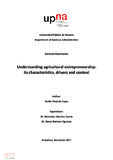Mostrar el registro sencillo del ítem
Understanding agricultural entrepreneurship: its characteristics, drivers and context
| dc.contributor.advisor | Sánchez García, Mercedes | es_ES |
| dc.contributor.advisor | Barrena Figueroa, Ramo | es_ES |
| dc.coverage.spatial | east=-105.2551187; north=54.5259614; name=América del Norte | |
| dc.coverage.spatial | east=-55.491477; north=-8.783195; name=América del Sur | |
| dc.coverage.spatial | east=9.135257; north=45.51923049999999; name=Europa-Asia | |
| dc.coverage.spatial | east=34.508523; north=-8.783195; name=África | |
| dc.coverage.spatial | east=103.8755699; north=1.3265456; name=Asia-Oceanía | |
| dc.creator | Pindado Tapia, Emilio | es_ES |
| dc.date.accessioned | 2019-02-07T13:51:03Z | |
| dc.date.available | 2019-02-15T00:00:11Z | |
| dc.date.issued | 2018 | |
| dc.date.submitted | 2018-02-15 | |
| dc.identifier.uri | https://hdl.handle.net/2454/32196 | |
| dc.description.abstract | It is often stated that farmers need to become more entrepreneurial to compete in modern agriculture and that their entrepreneurship generates positive spillovers. Much of the literature on agricultural entrepreneurship, however, has been focused on established farmers and little is known about new entrants. Furthermore, there is a need for a more in-depth understanding of the contextual factors that shape entrepreneurship among farmers. Therefore, the objective of this thesis is to investigate the individual and contextual determinants of entrepreneurial behaviours among farmers, with a special focus on new entrants. In order to do so, agricultural entrepreneurship was studied in its multidimensional facets, including behaviour, opportunity identification, growth and innovation. A comprehensive approach was developed through five empirical studies addressing factors that influence these entrepreneurial dimensions. The first study describes the entrepreneurship of the sector, analyzing the differences existing between new and established agri-entrepreneurs in relation to their counterparts in non-agricultural ventures. Results show that agri-entrepreneurs have weaker entrepreneurial capabilities than other sectors. However, new entrants into the agricultural sector are not less entrepreneurial in relation to other sectors, and show greater entrepreneurialism than established farmers. The second study examines the drivers of entrepreneurialism among new entrants. Results suggest that new farmers with confidence in their entrepreneurial competencies and entrepreneurial experience tend to be more entrepreneurial. Likewise, farmers’ social ties with other entrepreneurs increase this behaviour. The third study focuses on growth-oriented new agricultural ventures and their context. Results reinforce the importance of the above capabilities and networks, as well as the capabilities to effectively offer new products. Institutional and industry contexts also influence them as they need social legitimation, and those operating in less agriculturally competitive countries have a greater probability of becoming growth-oriented. The fourth study focuses on entrepreneurial innovation providing evidence that different entrepreneurial innovations arise from different entrepreneurial assets and context configurations. Finally, the fifth study presents an innovative approach using Twitter data to analyse attitudes towards food innovations. We found a complex set of factors that may underlie positive attitudes such as cultural diversity and intensity of information flows. This thesis contributes to the entrepreneurship field by contextualizing the entrepreneurial process and providing valuable insights for policy-makers to enhance farmers’ entrepreneurship. Our findings highlight the importance of entrepreneurial competencies as well as professional networks, which have consequences for tailoring education and training programs. This research enhances our understanding of how entrepreneurship is enabled and constrained by several overlapping dimensions of context, which has implications for policies aimed at improving entrepreneurial ecosystems. | en |
| dc.description.sponsorship | The research reported in this dissertation has been supported financially by the Project AGL2012-39793-C03-01 and AGL2015-65897-C3-1 (Spanish Ministry of Economy and Competitiveness); co-financed by FEDER. | en |
| dc.format.extent | 177 p. | |
| dc.format.mimetype | application/pdf | en |
| dc.language.iso | eng | en |
| dc.subject | Agricultural enterpreneurship | en |
| dc.title | Understanding agricultural entrepreneurship: its characteristics, drivers and context | en |
| dc.type | info:eu-repo/semantics/doctoralThesis | en |
| dc.type | Tesis doctoral / Doktoretza tesia | es |
| dc.contributor.department | Gestión de Empresas | es_ES |
| dc.contributor.department | Enpresen Kudeaketa | eu |
| dc.rights.accessRights | info:eu-repo/semantics/openAccess | en |
| dc.rights.accessRights | Acceso abierto / Sarbide irekia | es |
| dc.embargo.terms | 2019-02-15 | |
| dc.relation.projectID | info:eu-repo/grantAgreement/MINECO//AGL2012-39793-C03-01/ES/ | en |
| dc.relation.projectID | info:eu-repo/grantAgreement/MINECO//AGL2015-65897-C3-1-R/ES/ | en |
| dc.description.doctorateProgram | Programa de Doctorado en Economía, Empresa y Derecho (RD 99/2011) | es_ES |
| dc.description.doctorateProgram | Ekonomiako, Enpresako eta Zuzenbideko Doktoretza Programa (ED 99/2011) | eu |


